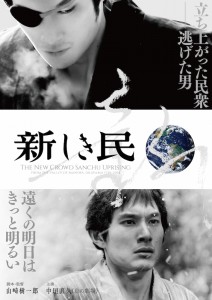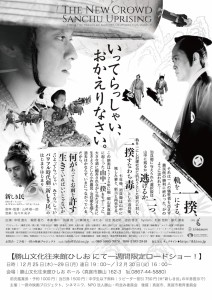 |
 |
Logline
From 1726 to 2014. Based on an actual uprising that occurred 280 years ago in Maniwa, Okayama Prefecture, this film depicts the agony of the men who were engulfed in the incident and the aftermath.
Introduction
Juichiro Yamasaki is a film director residing in Okayama who was highly praised both domestically and internationally for his previous film, The Sound of Light. The theme that he selected for his latest film was the “Sanchu Uprising,” an uprising by common people which actually occurred 280 years ago in Maniwa, Okayama Prefecture, where he currently resides. For Yamasaki, who receives assistance of the local people during film productions, Sanchu Uprising: Voices at Dawn was a huge challenge, since he had to create an independent film in the period drama genre. The shooting took place in various areas within the prefecture with the help of many local citizens. After its completion, the film will go on a screening tour. His previous film depicted the agony of a young dairy farmer. His latest film depicts the lives of the common people who were engulfed in the vortex of an uprising and its aftermath, but still tried to live ordinary lives.
Synopsis
The year is 1726. In Sanchu, located in Okayama Prefecture, Jihei is living quietly with his wife Tami, who is expecting a baby soon. One day, Tami’s elder brother Shinroku says that the village farmers are planning on negotiating with the domain to exempt various taxes, and asks Jihei to take part in it. Jihei reluctantly participates. Confronted by countless farmers and fearing that the situation will get out of hand, the domain accepts the farmers’ requests except for the exemption of mountain taxes. The mountain folks including wood workers and iron workers are furious with the result and they attack storehouses to steal rice. The domain quickly tries to suppress them, but the farmers decide to assemble and stand up once again to confront the domain. Unfortunately, the farmers are defeated by the domain’s overwhelming power. After witnessing the beheading of the farmers that are captivated, Jihei faces his conflicted feelings of what he should do, and decides to abandon his village and family and flee from Sanchu in order to stay alive. Years go by and being unable to return to his village, Jihei is living in a town. His life takes a drastic turn after a fateful encounter with one man. Jihei is forced to face the unforgettable past and decides to return to his village. How is the village now? How is Tami doing? With mixed feelings, Jihei heads to his village…
Director’s comment
I find myself constantly asking myself what exactly “freedom” means. And when I do, I would always face contradictions. I asked the same question when I began creating this film. I encountered “enthusiasm.” “Enthusiasm” is the light at night, the strength to walk and live… Through “enthusiasm,” maybe I can see the freedom that awaits beyond the contradictions. Not only I, but every single person who was involved, dedicated their maximum enthusiasm to this film. We eat, sleep, think, and move. A repetition of storing and releasing “enthusiasm.” In this sense, I think that the film Sanchu Uprising: Voices at Dawn is a film with infinite freedom. This film depicts an uprising that occurred just 280 years ago.
Director’s Profile
Born in 1978 in Osaka. Resides in Maniwa, Okayama. Engaged in farming. As a film director, Yamasaki created The Sound of Light in 2011. Aside from being screened in 51 locations throughout Okayama Prefecture, the film was screened in Tokyo as well as at the International Film Festival Rotterdam. It won the Nippon Visions Award at the Nippon Connection in Germany. Yamasaki’s film screening & production group, [cine/maniwa] won the Grand Prix of the Okayama Prefectural Art-Cultural Prize as well as the Fukutake Cultural Encouragement Prize.
Director’s Filmography
The Fall Leaves (2008) Short film
The Sound of Light (2011) Tokyo International Film Festival 2011, Japanese Eyes
International Film Festival Rotterdam 2012, Bright Future
Sanchu Uprising: Voices at Dawn (2014)
Cast
Naohisa Nakagaki
Kano Kajiwara
Shoichi Honda
Ryo Sato
Yota Kawase
Hotaru
Shinnosuke Uryu
Keiko Furuuchi
hyslom
Nobukazu Sugii
Yoshitomo Fujihisa
Staff
Director: Juichiro Yamasaki
Screenplay: Juichiro Yamasaki
Producer Hirotaka Kuwahara, Ai Kurokawa, Kayoko Nakanishi
Cinematography: Kenta Tawara
Lighting: Ken Owaku
Sound: Takao Kondo
Production design: Risshi Nishimura
Set & Props: Takayuki Uyama
Music Ayako Sasaki
Assistant Director: Kenji Fukushima
Hair and make-up: Shinmei Nakano
Costume design: Motoichi Iwakura
Still: Yoshiyuki Uchibori
Animation: Tomomichi Nakamura
Manzo’s Costume: Yukiko Beppu
Katsuyama Hariko (Elephant mask and Globe): Atsuki Takamoto
Production: Ikkino Project
Distribution Ikkino Project
Nippon Connection 2012, Nippon Vision Award
